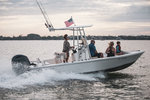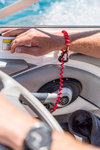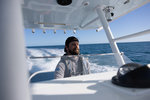



Before you go boating on the waterways this summer there are some important tips to remember to make it the safest and most fun experience it can be.
According to Erin Johnson, administrative director with the North Florida Marine Association, there is a list of seven things that that should always be on every boater’s mind.
No. 1 on the list is to make sure there are enough life jackets for each person on board in the case of an accident.
It is the law that all children 6 years old and younger should always have a life jacket on while a vessel 26 feet long or less is in operation.
According to Johnson, vessels that are more than 26 feet in length are considered a yacht and therefore fall under a different category of rules.
Another safety aspect the association heavily promotes is that all boaters take part in a boating safety class.
The classes often do not just focus on safety, but are also informative when it comes to navigation, tides and what to look for when monitoring whether patterns.
Remembering to check the weather forecast in the days leading up to a boating trip can go a long way in making sure the trip is an enjoyable on.
“If there are strong winds and rain coming, you probably don’t want to be out three on the water, because it’s not going to be a fun time anyway,” Johnson said. “There are so many apps, some that are designed with boaters and fishermen in mind.”
Life jackets are not the only safety gear that is required to be onboard every boat.
A noise maker of some kind is needed that can be used to draw the attention of other boats in the event of an accident on the water.
Vessels 16-foot or longer are required to have a “throwable floatation device” to help in the rescue of a passenger that goes overboard.
However, there are certain new laws or initiatives that can change from year to year, and a newly implemented law this year is the need for all boaters to have an engine cut-off device.
“It is similar to a leash you would see when surfing,” Johnson said. “It is a lanyard that is attached to the captain and around the helm of a boat, that way if the captain goes overboard the engine will immediately cut off.”
Johnson said there have been instances in the past where that situation occurred and the boat continues at its speed without anyone operating it, which can be dangerous for that boat and others around.
“It could be a fatal situation,” Johnson said.
Another safety change that has been implemented is that fire extinguishers must now be changed out every 12 years, so she reminded all boaters to check their devices expiration dates before heading out.
Electronic visual distress signals are also now allowed to be used on boats to go with or in place of flares, which had previously been the only option available.
If a long trek is planned for the boat, Johnson said that it is important give a “float plan” to others so that they have an idea of what part of the ocean you were planning to visit in case an emergency arises, and you do return as scheduled.
“It gives the Coast Guard a location where they pinpoint their search in the case of a search and rescue situation,” Johnson said.
The final safety tip to remember this summer is to remember to always operate a boat sober.
“Boats and alcohol just don’t mix,” Johnson said. “Make sure to have a designated captain and driver for the drive home once the boat gets back on the trailer.”